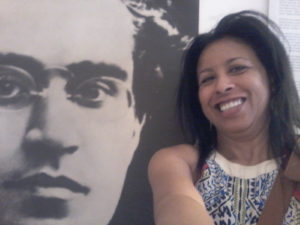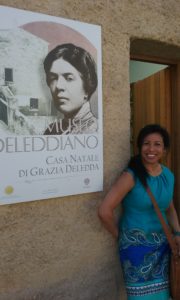Sonita Sarkar holds the Luis Selis Visiting Fellowship at the IMLR, 2017. Here, she discusses the research she is undertaking as part of her fellowship:
In my previous (and first) blog post, I pondered what positionality might mean for my research on Grazia Deledda and Antonio Gramsci, and what new insights this awareness might bring to prevailing paradigms of academic enquiry. In this post, I address ownership.
I actually undertook a voyage in the literal sense—a physical one that was inevitably also a culturally epistemological one. I went to Rome, and then Ghilarza, Ales, and Nuoro in Sardegna. Already, my own hybrid cultural and professional identities inform my research and naturally, this voyage. The juxtaposition of Rome with the Sardinian cities is part of my argument—that the relationship between the Italian nation-state (and its capital) and an island that has been characterised as a minoritised ethnicity (backward, traditional) is constitutive of Gramsci’s and Deledda’s depictions in their works. Gramsci was born in Ales and then moved at an early age to Ghilarza, and then to Turin; Deledda was born and lived in Nuoro, before moving to Rome. Neither returned to Sardegna.
So the nearness and distance of Sardegna to the Italian mainland nation-state was a continuous and vibrant element of the ways that Italians who are Sardinians and those who are not, talk about that relationship. Then, of course, are my own nearness to, and distance from, Sardegna, Italy, Deledda, and Gramsci. A valuable inflection added to this voyage was that an Italian-Sardinian colleague volunteered to accompany me. There were elements (such as specific access to some aspects and nuances of cultural life) were brought nearer through my companion. Simultaneously, my sense of distance was underscored by this mediation — that I am not Italian, am not Sardinian, and yet continue to approach, get nearer and nearer, through my work.
What sense of ownership or assumption of nearness does someone have who is ‘part’ of the culture, when working on representatives of that culture? My senses of both nearness and distance are present as conscious or intentional aspects, reminders that I believe are unique, important, and fruitful in informing the ways I engage with Deledda and Gramsci. What I own is my alertness to my position and, from it, a reminder not to assume ownership that may come from ‘belonging’ to the culture. A voyage to Rome, Ghilarza, Ales, and Nuoro is also a voyage near and through Deledda, Gramsci, and myself. The images depict both the existence of distance as well as the effort of nearness that my work negotiates.
Professor Sonita Sarker, 2017 Luisa Selis Visiting Fellow


